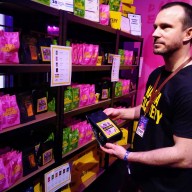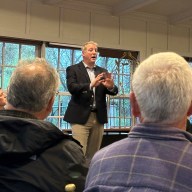During his Wednesday Berklee School of Music class, 24-year-old grad student Kevin Leong helped teach students the song “Jingle Bells” — not how to play the musical notes, but how to sing the English words. The students were guests at Rosie’s Place, a shelter for poor and homeless women and the first women’s shelter in the U.S. Many women who come to Rosie’s Place are immigrants and still struggle with speaking English. For the past three semesters, Leong has participated in a Berklee class that helps these women, many in their 40s, with their communication skills through music therapy practices.
Music therapy is an established health profession in which through music and a therapeutic relationship, people address the physical, emotional, cognitive and social needs on an individual, explained Peggy Codding, a professor of music therapy at Berklee. With this class, the therapy aspect comes from sharing personal stories. Berklee students sit down with women from Rosie’s and learn about their lives, asking the women where they grew up, stories about their home country, what holidays they celebrated and so on. The Berklee students then use their song-writing skills to turn those stories into lyrics. The students are also all trained in improvisation, Codding said.
They bring instruments like guitar and drums to class and give the Rosie’s women — many who have strong ties to music from their own cultures — maracas and shakers, to add rhythm to their conversations. Leong noted that the aim of the class is not to improve the women’s “grammar or syntax,” but to connect and make them more comfortable with an unknown language by tying it to the common denominator of sound. “What we aim to do is improve their conversational English and confidence in speaking,” he said. “We empower them through songwriting, using their words exactly to write the songs.”
Jayne Garceau, a 19-year-old Berklee student in the class this semester, reiterated the idea of making these women more confident.
Through music, Berklee students help foreign-language speakers learn English
“If you don’t have confidence when you speak [a foreign language], you won’t want to, and then you won’t improve,” she said. “Integrating music, it gets rid of that idea of having to get over your fear.”
When teaching a song to the women, the Berklee students go slow: word by word, line by line, to help the women with repetition and articulation. But it’s not just the women who are learning from this class.
“It’s definitely given me perspective,” Garceau said. When she first came to Berklee from a small town outside of Chicago, she realized how different things were here and worried about adapting.
“But after seeing these women who came from the Dominican Republic, Africa, China, be here at Rosie’s wanting to learn English, coming every week from places they have to travel an hour from just for a two hour English lesson to better themselves and their community, that’s amazing,” she said.
Next week, the Berklee students will reveal the final recordings of the women’s songs to them, giving them CDs to take home. Leong said it’s “extremely gratifying” to see how happy the women are when they hear the final product, and the Rosie’s staff sees that, too.
“When we first started talking to people at Berklee, we weren’t sure how music fit into our ESOL [English for Speakers of Other Languages] curriculum,” said Michele Chausse, a spokesperson for the shelter. “But we’ve found that the songwriting project has been educational and uplifting for our students. The women are building language by working on song lyrics with the students and, as you can imagine, there’s joy in hearing their creations and singing along.”
Music therapy is often used in medical settings like hospitals or to help with developmental needs, like autism, Codding said. This collaboration with Rosie’s is unique, she said, but it’s clear how much it helps both Rosie’s women and the Berklee students.
“Where there isn’t language, there is music,” Codding said.


















